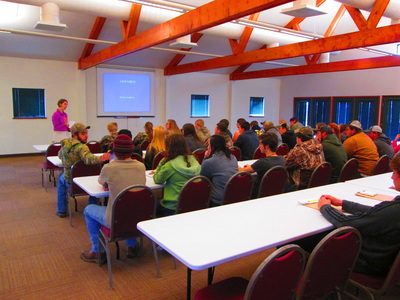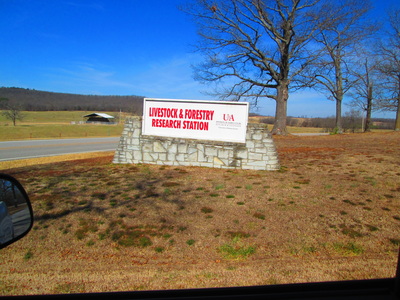FFA Workshop
|
The Conservation District conducted a FFA Judging Workshop on February 19, 2020 at the U of A Livestock and Forestry Experiment Station near Bethesda. There were 15 schools in attendance. These schools were Batesville, Cave City, Mountain Home, Cedar Ridge, Midland, Sloan-Hendrix, Jackson Co., ICC, Salem, Concord, Newport, Highland, Mountain View, Southside, and Viola.
The workshop was conducted to help the students get ready for the competitions at the district and state level. The judging contest offered at the workshop included Livestock, Land, Poultry, and Forestry. There were 200 participants from the different schools and this includes the instructors/helpers. |
SPECIAL THANK YOU TO OUR SPONSORSMerchants and Planters Bank
First Community Bank Arkansas Forestry Commission University of Arkansas Livestock and Forestry Experiment Station Coorperative Extension Service Without their support we would not be able to provide hot food and drinks to the students and instructors in the different areas of study. |
Irrigation and Soil Health Informative
Meeting
On March 8, 2017, Independence County Conservation District held an irrigation meeting at the community center in Oil Trough. With the cost of diesel and farming going up, we had several producers wanting to know the advantages of surge valves in irrigation.
The meeting started with Roger Cousins, Independence County District Conservationist welcoming all those present and thanked the sponsors for their support. He also told the producers present about Independence County Conservation District’s flow meter & surge valve that they have for producers to use and see if they want to implement them on their farm.
First on the agenda was Mike Hamilton, University of Arkansas, he talked to the producers about side inlet, using a surge valve, and using the pipe planner app. The information that you input into pipe planner will give you where the hole for irrigating a field should be placed and the size of the hole also. He also discussed how a surge valve can be set up to automatically move the water from one field to another and save the producer time in doing this manually if they surge valve is set right. Mr. Hamilton showed producer how to sign up on the site and get started.
The next speaker of the day was Charolette Bowie, Natural Resources Conservation Service (NRCS) State Irrigation Engineer. She spoke about the different management practices and irrigation practices that NRCS has that producers can apply for. Ms. Bowie told some of the benefits of these practices compared to others.
Tim Smith was next on the agenda. He talked about the use of cover crops and how it helped with irrigation. By using cover crops the producers can reduce the input of fertilizers and how much water they use which saves them money.
When Tim concluded he introduced Keith Scoggins to speak about the Arkansas Soil Coalition. He informed the producers that this was a new coalition that was just starting so producers could come together and share the knowledge about practices that have helped them conserve their land. They are planning meetings in the future to help with spreading the word on cover crops and ways that producers have benefited from irrigation practices.
The last speaker of the day was Jeremy Huff, Natural Resources State Land Specialist, took us outside to the rainfall simulator. In the simulator we had three types of soil there was no-till farm land, conventional tilled ground, no-tilled pasture ground, and conventional tilled pasture. What the simulator does is take these different types of soil and simulates rain fall on them. The no-till ground absorbed the rain at a much faster rate than the conventional tilled ground. In showing this we learned the no-till method will allow for better absorption of the water where the conventional till not only does not absorb the water but allows soil to the wash off with the water.
The meeting concluded with lunch at Sissy’s Café in Oil Trough. The Independence County Conservation District wishes to thank the speakers for attending and sharing their knowledge with our producers. The meeting was sponsored by Independence County Conservation District, Arkansas Natural Resources Commission, Natural Resources Conservation Service, and U of A Corporative Extension Service. Watch for future meetings on irrigation.
FFA WORKSHOP 2017
Irrigation Meeting
|
On February 23, Independence County Conservation District held an irrigation meeting at the community center in Oil Trough. With the cost of diesel and farming going up, several producers wanting to know the advantages of irrigation.
The meeting started with Tanner Johnston, Craighead County District Conservationist welcomed all those present and thanked the sponsors for their support. He also told the producers present about Independence County Conservation District’s flow meter that they are purchasing for producers to use to flow their wells. The first speaker of the day was Charlotte Bowie, Natural Resources Conservation Service (NRCS) State Irrigation Engineer. She spoke about the different management practices and irrigation practices that NRCS has that producers can apply for. Ms. Bowie told some of the benefits of these practices compared to others. Tim Smith was next on the agenda. He talked about the use of cover crops and how it helped with irrigation. By using cover crops the producers can reduce the input of fertilizers and how they water which save money. Due to the threat of rain the agenda was changed and Jeremy Huff, Natural Resources State Land Specialist, took us outside to the rainfall simulator. In the simulator we had four types of soil there was no-till farm land, conventional tilled ground, no-tilled pasture ground, and conventional tilled pasture. What the simulator does is take these different types of soil and simulates rain fall on them. The no-till ground absorbed the rain at a much faster rate than the conventional tilled ground. In showing this we learned the no-till method will allow for better absorption of the water where the conventional till not only does not absorb the water but loses soil to the wash off of the water. In the no-till ground Tanner Johnston stated there were more earth worms and healthy vegetation needed in the dirt than the conventional till ground. Last on the agenda was Mike Hamilton, University of Arkansas, he talked to the producers about side inlet and using the pipe planner app. The information that you input into pipe planner will give you where the hole for irrigating a field should be placed and the size of the hole also. Mr. Hamilton showed producer how to sign up on the site and get started. The meeting concluded with lunch at Sissy’s Café in Oil Trough. The Independence County Conservation District wishes to thank the speakers for attending and sharing their knowledge with our producers. The meeting was sponsored by Independence County Conservation District, Arkansas Natural Resources Commission, NRCS, and U of A Corporative Extension Service. Watch for future meetings on irrigation. |
|


